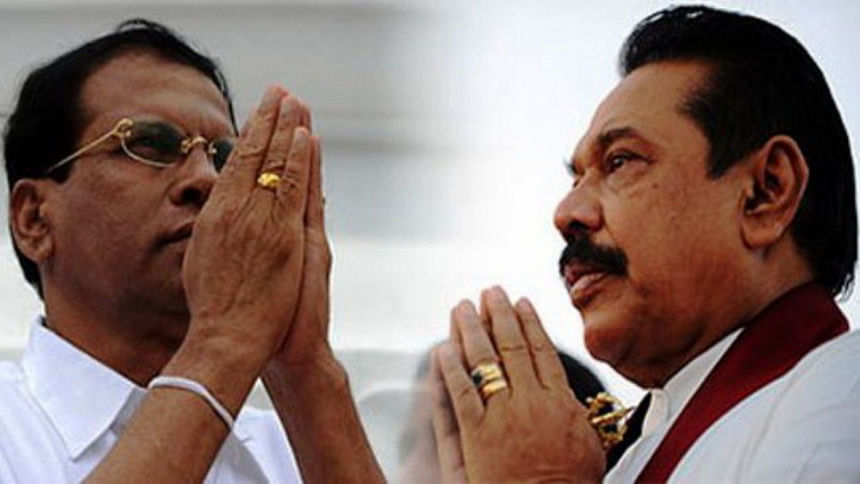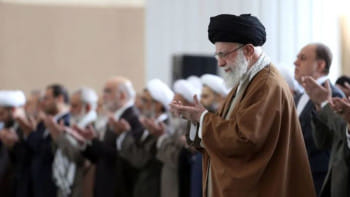A constitutional crisis in Sri Lanka

President Maithripala Sirisena of Sri Lanka, in a sudden unconstitutional move, dismissed Prime Minister Ranil Wickremesinghe and appointed his nemesis and former president Mahinda Rajapaksa as the new prime minister on October 26. The coup has left the three-year-old fragile national unity government (UNP and UPFA) in tatters.
The 225-seat 15th Sri Lankan parliament was constituted during the election on August 17, 2015. Ranil Wickremesinghe's United National Party won 106 seats—seven seats short of simple majority. Earlier in November 2014, Maithripala Sirisena, who was Minister of Health in President Mahinda Rajapaksa's cabinet, rebelled and defected from the United People's Freedom Alliance and contested the presidential election in January 2015, defeating Rajapaksa. It was actually Ranil Wickremesinghe who instigated Sirisena to rebel against Rajapaksa and eventually helped him win the presidency.
But in the parliamentary election in 2015, Sirisena's faction of UPFA managed to get only 33 seats. After the lone MP of Sri Lankan Muslim Congress and the 33 UPFA MPs joined UNP, Wickremesinghe secured a clean majority of 140 seats in the parliament. An indebted Sirisena thus invited Wickremesinghe to form the United National Front for Good Governance. Rajapaksa's faction of UPFA got 62 seats and sat on opposition benches.
The history of conflict between UNP and SLFP never allowed Sirisena and Wickremesinghe to be at ease with each other. There are apparently two burning issues for this.
Firstly, ideological differences between the two leaders kept them apart. While Sirisena remained essentially an UPFA man, Wickremesinghe could not compromise on UNP ideology. Sirisena's economic policy was based on the Sri Lanka Freedom Party's (origin of UPFA) ideology of agriculture-oriented import substitution strategy. Wickremesinghe's centre-right neoliberal economic strategy, on the other hand, was devoted to an open economy, foreign investment and tourism. Sirisena once complained that the country was being mortgaged to international capitalists and imperialists. He also accused Wickremesinghe's step-motherly financial treatment of SLFP ministers and MPs.
Secondly, although he held the post thrice as prime minister, an ambitious and desperate Wickremesinghe always had presidential ambitions. His subtle strategy was to keep the SLFP divided so that he can win the next election in 2020. Not surprisingly, Sirisena suspected Wickremesinghe's clever policy to undermine the political influence of UPFA. Sirisena was actually at a loss on how to continue with the alliance with UNP led by an arrogant Wickremesinghe. Sirisena knew that unless Wickremesinghe is stopped, he would most likely become the next president. It was probably these frustrations that pushed Sirisena to engineer a no-confidence motion against Wickremesinghe in April 2018. However, Wickremesinghe survived the motion comfortably getting support from 122 legislators.
While Sirisena was becoming increasingly insecure about his political career and life, opposition leader Mahinda Rajapaksa also joined the band of Wickremesinghe critics. Rajapaksa criticised Wickremesinghe's handling of the government saying that everything was going from bad to worse. He pointed that the investigations and cases being conducted by Wickremesinghe's government against the Rajapaksa family were a means to waste time in order to prevent the Rajapaksas from spearheading a movement of political renaissance against the government. In the background of all these developments, the Rajapaksa camp won a landslide victory in the provincial elections last year. That immensely strengthened his political position nationally.
Sri Lankan media reported that an exasperated Sirisena on October 3 met Rajapaksa and his brothers for a political tête-à-tête. Sirisena discussed realigning politically with the Rajapaksas, removing Wickremesinghe as prime minister and setting up a new coalition government under a new prime minister. The discussion ended on an optimistic note but without any decision. Since then, the two met several times at social events and had positive chats.
Ranil Wickremesinghe's fall did not come suddenly. It came after several long discussions between Sirisena and Rajapaksa family members. Rajapaksa laid down clear conditions to Sirisena that he shall have to cut off all coalition ties with UNP before he would allow Sirisena back into the fold. If Sirisena did that, only then would Rajapaksa be able to get the full support and cooperation of his party members for Sirisena.
Then came the incredible story that two months ago there was a conspiracy to assassinate Sirisena. The news went viral pointing fingers at India's RAW. This was revealed by Rajapaksa's brother Gotabaya, the ex-defence secretary. The accusation was that Wickremesinghe's government did not take any constructive action.
The Rajapaksa faction of UPFA had always considered Sirisena as a traitor, who backstabbed Rajapaksa and joined UNP to bring him down. Party members gave Rajapaksa full powers to decide on Sirisena rejoining UPFA—on the condition that Sirisena's leadership in any form would not be accepted. Sirisena must have considered all these pros and cons before deciding to ally with Rajapaksa with the assurance of his party faction that they will protect his life and political career under the powerful Rajapaksa family.
President Sirisena prorogued the parliament until November 16, 2018 after dismissing Wickremesinghe. That has effectively denied Wickremesinghe any chance to prove his majority in the parliament. Meanwhile, to complicate matters further, the Speaker of the Parliament Karu Jayasuriya wrote a letter to the president and requested him to reconvene parliament so that Wickremesinghe could prove his majority. He also said that he recognised Wickremesinghe as the prime minister. Wickremesinghe stated at a press conference that he had majority in parliament and was still the prime minister. As of October 29, Rajapaksa attended office for the first time after being sworn in as the new prime minister.
It is possible that Beijing will be happy with Rajapaksa becoming prime minister, while Delhi, which is alleged by some to have played a role in ousting Rajapaksa in January 2015, may have to reconsider its policy towards Sri Lanka. The political chaos that President Sirisena initiated will be difficult to be resolved constitutionally. There are more surprises to come.
Mahmood Hasan is a former ambassador and secretary of the Bangladesh government.










Comments